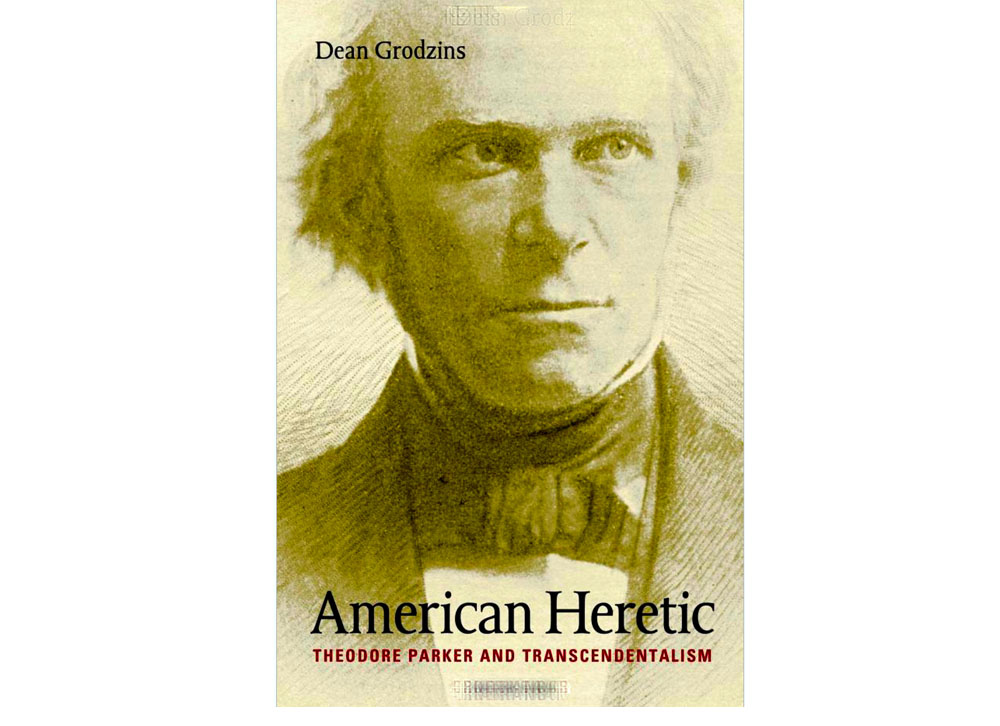American Heretic: Theodore Parker and Transcendentalism, by Dean Grodzins. University of North Carolina Press, 2002, 656 pages.
It’s surprising that Theodore Parker isn’t better known than he is. Parker (1810-1860), a transcendentalist, was a friend of Emerson. He inspired Thoreau. He was in the thick of things in the Boston-Concord area during his era. Abraham Lincoln and Martin Luther King Jr. picked up some famous rhetoric from Parker. For example, Parker’s words, talking about slavery, were:
I do not pretend to understand the moral universe; the arc is a long one, my eye reaches but little ways; I cannot calculate the curve and complete the figure by the experience of sight; I can divine it by conscience. And from what I see I am sure it bends towards justice.
This inspired Martin Luther King’s famous words:
The arc of the moral universe is long, but it bends toward justice.
In his Gettysburg address, Lincoln was paraphrasing words that Parker used in a speech in 1850: “A democracy — of all the people, by all the people, for all the people.”
Parker was a Unitarian. The Unitarians had more room for Parker than, say, the Methodists and the Presbyterians, but even some of Parker’s Unitarian friends shunned Parker as Parker became increasingly heretical.
What were some of Parker’s heresies? For one, Parker pretty much threw the entire Old Testament under the bus as primitive and unbelievable (not to mention lousy even as metaphor) and dominated by a cruel and immoral God. The question of miracles, and whether miracles were important or not, apparently was a big theological issue in Parker’s time. Parker came to believe that New Testament miracles were of no importance and probably didn’t really happen, that a revelation stood or fell on its own merit. Parker believed that some of the teachings of Jesus — not to mention the apostles — was wrong and morally flawed. Parker also rocked the boat. He became an outspoken abolitionist. Even Boston churchmen during this era who disapproved of slavery were careful not to preach too vehemently against slavery, because it got people too excited. Abolitionists were expected to be discreet in genteel society.
In many ways, this book is a theological history as much as a biography of Theodore Parker. These guys weren’t just preaching sermons to their congregations. They also were carrying on a theological debate with each other, a debate that also reached into the newspapers and the many church journals that were printed at the time.
I think it would be fair to say that Parker’s heresy boiled down to this: That ultimately, conscience, not scripture, is the only reliable guide. Note that in his statement about justice, it is conscience that allows Parker to divine the arc of the moral universe. I think it also would be fair to say (nor does Dean Grodzins say such a thing in this biography) that Parker left theology behind and became a moral philosopher instead. I think it also would be fair to say the same of Ralph Waldo Emerson, who actually gave up the ministry because it held him back. As for moral philosophy, Parker certainly was influenced by Kant. Parker also read in twenty languages, and he was particularly interested in German philosophy of that era. On a year-long trip to Europe, Parker tried to visit Goethe’s widow, but she was out.
It’s a shame to lose the thoughts of people like Theodore Parker who were so far ahead of their time. It’s amazing, really, how much progress was made in the 19th Century by the intellectual elite, though very little of that filtered down to incurious common folk. The white Protestant churches preach the same old fundamentalist, know-nothing stuff today, as though Emancipation and Civil Rights and all that thought and progress never happened. One of Parker’s complaints about social injustice, actually, was that working people had to work too hard and had little time for reading and study and bettering themselves intellectually. I wonder what Parker would think of television. Congregations at the time — at least Unitarian congregations — actually followed these debates and got intellectually involved. As Parker’s fame grew, people packed large halls in Boston to hear him speak. Who buys tickets to lecture series today? Are there even any lecture series to buy tickets to?
This biography ends around 1846, about 14 years before Parker’s death in 1860. Is Grodzins planning a second volume? Or was it that Grodzins was primarily interested in tracing the development of Parker’s heresy, and that was a done deal by 1846?

One Comment
Thanks David, a nice read
I plan to read up on this fella, unfortunately died very young
H
Post a Comment